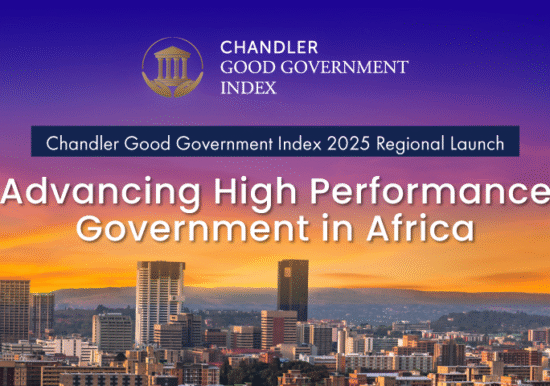
Preparing Leaders for Tomorrow’s World
How can government attract, retain, and train top talent?
Good Government Needs Good People
”Running a government is like conducting an orchestra,” Singapore’s founding Prime Minister Lee Kuan Yew once wrote: ”No prime minister can achieve much without an able team.”1
Assembling such a team across all levels of government is not a new challenge. However, it is a task that is becoming more urgent as countries seek to address concerns that are increasingly complex and interconnected. Recent crises are placing ever greater demands on public servants to perform well and make good decisions. What will it then take for governments of the future to form their dream teams?
”Outgunned” in the Competition for Talent?
The OECD points out that today’s complex policy challenges call for skilled public servants, especially those with expertise in important domains. Recruiting for capabilities is key.
But with increasingly constrained resources2 and labour shortages,3 governments face stiff competition in recruiting and retaining talent, especially since the private sector typically offers larger salaries and greater workplace flexibility.4 This is especially so in the STEM (science, technology, engineering, and maths) fields that power technological development.
The Power of Purpose
However, governments have an edge over the private sector in one crucial area: their ability to connect work with a sense of purpose and service.5 This could be the significant advantage in attracting younger talent—the very segment needed to lead and deliver good governance in the future. For instance, research on Gen Z (those born between 1997 and 2012), concludes that it is the first generation to prioritise purpose over salary.6 Separate research, on more than 13,000 workers globally and 1,500 public servants, agrees that public sector workers today are looking for more than an attractive salary. They want meaning and purpose from their jobs.7
Examining the Relationship Between Good Governance and Public Sector Integrity
r=0.90

Conversely, this also suggests that falling trust in government can erode the appeal of public service.8 9
The Index for Public Integrity (IPI) measures corruption risk across 114 countries.10 When we examine the relationship between IPI and CGGI scores across the 104 countries in common, a strong correlation is apparent (see chart opposite). If people do not trust their government, it could be inferred that they would be less likely to want to work in public service. This does not bode well for those countries that want to raise their governance game and attract the best talent.
Measuring People Power
Several of the CGGI indicators can help gauge the core capabilities governments will need to succeed in people development. The Leadership & Foresight pillar comprises five people-focused indicators: Ethical Leadership, Long-Term Vision, Adaptability, Strategic Prioritisation, and Innovation. And the Strong Institutions pillar comprises four indicators that measure key collective attributes for public service: Coordination, Data Capability, Implementation, and the Quality of Bureaucracy.
Below we examine patterns that are emerging across these indicators over several years. We look at four countries, from four separate continents, which have all made recent steps towards developing the people that power good governance.
MONGOLIA
Climbing in Leadership & Foresight
Between 2021 and 2024, Mongolia climbed eight spots in the overall CGGI rankings (to 77th overall this year). In the same period, it also climbed eight places in the Leadership & Foresight pillar. Relative to its overall rank, Mongolia performed particularly well in 2024 in the indicators for Strategic Prioritisation (44th), Quality of Bureaucracy (55th), and Education (54th). The country boasts the highest number of universities per capita in the world.11 Its first higher education institute—Mongolia’s National Academy of Governance (NAOG), founded in 1924—was focused on governance.12 The NAOG’s mission is ”assisting the Government of Mongolia in preparing the next generation of leaders in Mongolian public and private sectors”.13 This focus on the next generation is significant, given that more than a third of Mongolia’s population is between the ages of 15 and 34 years old, making it the country’s largest demographic.14

The NAOG collaborates with international institutions and universities worldwide, to build up the Mongolian public sector’s learning and development capabilities.15 The NAOG also has partnerships with the World Bank, the Asian Development Bank, the Asian Association for Public Administration, and nine separate embassies to conduct training programmes for government personnel.16
The country’s administration has linked public sector training with its long-term national vision (Vision 2050). One of its stated goals is to focus on creating a civil service that is effective, transparent, and competent. The government is tracking progress toward that goal and other governance-related goals against a number of World Bank indicators, such as government effectiveness.17
The Mongolian government is also placing special focus on tech talent. The government created the Ministry of Digital Development of Mongolia in 2022—the same year it also launched the ”e-Mongolia Academy”18 to improve civil servants’ digital skills. As further illustration of the future-oriented civil service Mongolia wants to encourage, Bolor-Erdene Battsengel was appointed Vice Minister of Digital Development at the age of 29, making her the youngest person to hold such a senior appointment in Mongolia.19
GREECE
Big Gains in Relevant Indicators
For both the Long-Term Vision and Adaptability indicators, no country has improved more between 2021 and 2024 than Greece, leaping from 100th in these indicator rankings to 29th and 32nd respectively. Relative to its overall rank (41st), Greece also performs well in 2024 in the Education (24th) and Quality of Bureaucracy (37th) indicators.
Since 1983, Greece’s civil servants and local officials have been trained by EKDDA, its National Centre for Public Administration and Local Government. EKDDA is overseen by the country’s Ministry of Interior,20 and has been strengthened by recent investments from the EU’s Recovery and Resilience Facility.21 With almost 1,000 permanent, temporary, and part-time staff, the Centre is responsible for training some 500,000 civil servants.22
EKDDA takes a range of approaches to developing civil servants. Its Institute of Training improves public servants’ knowledge and skills through more than 1,800 training programmes, which cater to the organisational goals and needs of Greece’s government agencies. In 2023, it collaborated with Microsoft to strengthen public servants’ digital skills.23 A separate body, the National School of Public Administration and Local Government, helps select and train Greece’s public sector executives.24
Applicants have to pass an entrance exam, meet certain criteria, and complete 18 months of rigorous training.25 As EKDDA President Evi Dramalioti explained to the Chandler Academy of Governance in 2022: ”It is extremely important to have qualified executives capable of managing complex problems and supporting decisions made at the political level.”26

Notably, the Greek government has also stepped up efforts to attract and encourage young workers to join the civil service, with Prime Minister Kyriakos Mitsotakis offering them ”meaningful engagement in change”.27 The country’s wide-ranging National Youth Strategy28 encourages young people to participate in government, while the ”Rebrain Greece” initiative looks to encourage talented young Greeks who moved abroad to return to the country.29
URUGUAY
Excels at Prioritisation
In this year’s CGGI, Uruguay was the 7th-highest scoring country in the Leadership & Foresight pillar—a strong performance relative to its overall rank in the CGGI (31st). It ranked third overall in the Strategic Prioritisation indicator and 15th in the Long-Term Vision indicator. Conditions in Uruguay suggest a good prospect for attracting a well-educated population to work in an increasingly diverse, trusted public sector. The country has high youth literacy rates (99%), and has seen increasing gender diversity in Parliament30—the country’s rank in both CGGI Gender Gap and Non-Discrimination Indicators climbed at least 13 spots between 2021 and 2024. Its government is also seen as honest, with Uruguayans reporting the lowest perceptions of corruption of any Latin American country.31

The OECD reported in 2021 that, “Uruguay has been moving towards a modern, merit-based, transparent recruitment system for public servants”.32 In that same report, the OECD singled out the “Uruguay Concursa portal” for praise. Launched in April 2011 by the National Civil Service Office, the portal has reduced hiring delays, made openings more transparent, and helped reduce political appointments at senior positions.33
Living up to its strong capabilities in Strategic Prioritisation and Long-Term Vision, Uruguay has also been praised for its work to get public servants up to speed on AI. In its 2023 AI Readiness Index, Oxford Insights highlighted the Uruguayan government’s innovative initiatives in becoming more AI-ready across areas such as capacity-building and AI ethics,34 lauding its programmes on everything from the fundamentals of AI to more advanced courses on machine learning and data integrity.35
MALAWI
Focusing on the Future
Like the other countries profiled in this section, Malawi’s rank in the Leadership & Foresight pillar (54th) is higher than its overall ranking (99th). In the Long-Term Vision indicator, Malawi ranks 13th. Both its Quality of Bureaucracy (79th) and Adaptability (76th) are also high relative to its overall rank. Malawi’s former Minister of Finance Dr Goodall Gondwe has said that the country’s civil service was once “rated as Africa’s best in the 1970s”.36 The country has, with some success, attempted reforms to restore Malawi’s civil service to this vaunted status.37
Malawi’s national vision, MW2063,38 is explicit about the need for good governance in realising the country’s aspirations for the future. Among the targets set out by MW2063 is the development of a high-performing and professional public service that will promote, attract, and retain world-class talent.39

In 2022, the government established the Malawi School of Governance,40 which is tasked with training public servants—fostering pride in the civil service as well as a sense of purpose, values, and professional ethics in public service employees. In the summer of 2022, 45 Principal Secretaries from various ministries attended an intensive programme to “enhance their leadership and management skills”.41
Other educational initiatives are also underway. The University of Lilongwe’s newest school, focused on Governance, Law, and Policy,42 is part of a broad initiative to meet the education and training challenges of a new Malawian democratic society and supporting the process of social, political, and economic transformation in Malawi.43
Half of Malawi’s population are youth—defined by the government as those aged between 10 and 35.44 The country’s public sector stands to benefit from younger generations looking for more meaningful and purpose-centred work in the civil service. An objective of the government’s National Youth Policy is to meaningfully increase the participation of youth in decisions ”at all levels”. One of the Policy’s ten priority areas is ”youth inclusion in governance systems”. The government has also created the National Youth Council of Malawi to help encourage young people to participate in governance at the community level.45
In future years, the CGGI will continue to offer data-driven perspectives on the race to cultivate the next generation of competent and committed civil servants—highlighting the capabilities they will need to deliver good governance in a changing world.
Endnotes
- Yew, L. K. (2000). From Third World To First: The Singapore Story: 1965-2000. Harper.
- Balancing government budgets amid uncertainty. (2023, January 26). Economist Impact – Perspectives. https://impact.econ-asia.com/perspectives/sites/default/files/completed_saab_report_0.pdf
- OECD. (2023). International talent attraction and retention. OECD iLibrary. https://www.oecd-ilibrary.org/sites/e8e5cabe-en/index.html?itemId=/content/component/e8e5cabe-en#biblio-d1e8892-a11a03f41
- OECD. (2021). Public Employment and Management 2021: The Future of the Public Service. OECD Publishing.
- Checinski, M., Dillon, R., Hieronimus, S., & Klier, J. (2019, March 5). Putting people at the heart of public sector transformations. McKinsey & Company. https://www.mckinsey.com/industries/public-sector/our-insights/putting-people-at-the-heart-of-public-sector-transformations
- Aziz, A. (2021, December 10). The Power of Purpose: the business case for purpose (All the data you were looking for Pt 2). Forbes. https://www.forbes.com/sites/afdhelaziz/2020/03/07/the-power-of-purpose-the-business-case-for-purpose-all-the-data-you-were-looking-for-pt-2/?sh=17ee5f3f3cf7
- Athanasakopoulos, G., Blackburn, S., Dowling, B., Gardner, N., Lu, S., McConnell, M., & Mugayar-Baldocchi, M. (2022, October 26). What workers want is changing. That could be good for government. McKinsey & Company. https://www.mckinsey.com/industries/publicsector/our-insights/what-workers-want-is-changing-that-could-be-good-for-government
- Kehoe, S. (2022, January 20). Trust in Government: a stark divide. Edelman. https://www.edelman.com/trust/2022-trust-barometer/trust-government-stark-divide
- In whom do we trust? Less in institutions and more in communities in LAC. (2024, January 23). UNDP. https://www.undp.org/latin-america/blog/whom-do-we-trustless-institutions-and-more-communities-lac
- Index of Public Integrity. (2023). Corruption Risk Forecast. https://corruptionrisk.org/integrity/
We recognise that the CGGI and Index of Public Integrity may share common underlying indicators. From an in-depth comparison, we identified three such indicators within the CGGI. Removing them from the CGGI drops the correlation between the two indices marginally from 0.901 to 0.888.
- Gantogtokh, O. (2022, July 21). Mongolia’s paradoxical education problem. East Asia Forum. https://eastasiaforum.org/2022/07/21/mongolias-paradoxical-education-problem/
- Ganbold, E. (2013, December). Mongolia’s National Academy of Governance: By Way of Introduction. International Journal of Civil Service Reform and Practice. https://www.astanahubjournal.org/index.php/ijcsrp/article/view/31/31
- UNOSSC – United Nations Office for South-South Cooperation. (n.d.). https://unsouthsouth.org/
- Strengthening youth in Mongolia’s Decision-Making. (2021, April 9). UNDP. https://www.undp.org/mongolia/blog/strengthening-youth-mongolias-decision-making
- Public Administration (Learning & Development) Programme in Mongolia. (n.d.). Temasek Foundation. https://temasekfoundation.org.sg/programmes-s/Public-Administration-Learning-and-Development-Programme-in-Mongolia
- UNOSSC – United Nations Office for South-South Cooperation. (n.d.).
- Mongolian Government. (n.d.). Vision 2050. https://vision2050.gov.mn/eng/index.html
- Neal, T. (2022, August 12). Transforming Mongolia into a Digital Nation: Interview with Ministry of Digital Development. The Fast Mode. https://www.thefastmode.com/expert-opinion/26849-transforming-mongolia-into-a-digital-nation-interview-with-ministry-of-digital-development
- Nylander, J. (2023, November 2). Girl power is helping shape Mongolia’s digital future. Nikkei Asia. https://asia.nikkei.com/Life-Arts/Life/Girl-power-is-helping-shape-Mongolia-s-digital-future
- National Centre for Public Administration and Local Government (EKDDA). (n.d.) https://www.ekdd.gr/en/
- Greece’s recovery and resilience plan. (2023). European Commission. https://commission.europa.eu/businesseconomy-euro/economic-recovery/recovery-and-resilience-facility/country-pages/greeces-recovery-and-resilience-plan_en
- National Centre for Public Administration and Local Government (EKDDA). (n.d.).
- Tsiliopoulos, E. (2023, February 21). Microsoft creates digital skills academy for 250,000 Greek civil servants. New Greek TV.
- National School of Public Administration and Local Government (ESDDA). (n.d.) https://www.ekdd.gr/en/the-school/esdda-profile/
- National Centre for Public Administration and Local Government (EKDDA). (n.d.)
- Global Survey on Public Sector Training. (2022). Chandler Academy of Governance. https://chandleracademy.org/survey-report-2022
- Zhao, Y. (2023, April 10). Prime Minister of Greece emphasizes importance of young people entering politics, working to create societal change. Yale Schwarzman Center. https://schwarzman.yale.edu/news/prime-minister-greece-emphasizes-importance-young-people-entering-politics-working-create
- European Commission. (2024, March 5). National youth strategy. YouthWiki: Greece. https://national-policies.eacea.ec.europa.eu/youthwiki/chapters/greece/13-national-youth-strategy
- Stamouli, N. (2020, January 21). Greece’s reverse brain drain. POLITICO. https://www.politico.eu/article/greece-reverse-brain-drain-skills-young-people-financial-crisis/
- World Bank. (n.d.). Uruguay. World Bank Open Data. https://data.worldbank.org/country/uruguay
- Corporación Latinobarómetro. (2023). https://www.latinobarometro.org/lat.jsp
- OECD (2021), OECD Investment Policy Reviews: Uruguay, OECD Investment Policy Reviews, OECD Publishing, Paris, https://www.oecd-ilibrary.org/sites/7950024c-en/index.html?itemId=/content/component/7950024c-en
- Oficina Nacional del Servicio Civil. (2024). Oficina Nacional Del Servicio Civil. https://www.gub.uy/oficinanacional-servicio-civil/
- Government AI Readiness Index. (2023). Oxford Insights. https://oxfordinsights.com/ai-readiness/ai-readinessindex/
- Ibid.
- Van Donge, J. K. (2015). Reflections on Malawian Civil Service Reform. In A. M. Kjær, L. Engberg-Pedersen, & L. Buur (Eds.), Perspectives On Politics, Production and Public Administration In Africa, Danish Institute for International Studies (pp. 117–132). Danish Institute for International Studies.
- Malawi National Public Sector Reforms Policy (2018-2022). (2018, February). Office of the President and Cabinet, Republic of Malawi. https://npc.mw/wpcontent/uploads/2020/07/Malawi-Public-Sector-Reforms-Policy.pdf
- Malawi Vision 2063: An inclusively wealthy and self-reliant nation. (2021, January 19). United Nations: Malawi. https://malawi.un.org/en/108390-malawivision-2063-inclusively-wealthy-and-self-reliant-nation
- Ibid.
- Malawi School of Government-Kanengo Campus. (2023, February 3). Malawi School of Government-Kanengo Campus on LinkedIn. https://www.linkedin.com/posts/malawi-institute-of-management_malawischoolgovernment-malawi-activity-7027264793497509888-DKZj/
- Commonwealth conducts leadership training for Malawi’s top civil servants. (2022, July 12). Commonwealth. https://thecommonwealth.org/news/commonwealthconducts-leadership-training-malawis-top-civil-servants
- School of Governance–University of Lilongwe. (n.d.). https://unilil.ac.mw/schools/school-of-governance/
- Ibid.
- Malawi National Youth Policy (2023-2028). (2023, November 1). YouthLead. https://www.youthlead.org/sites/default/files/YouthLead/files/resources/Malawi%20National%20Youth%20Policy%202023.pdf
- National Youth Council of Malawi website. (2024). https://www.nycom.mw/?page_id=612
More Stories


Helping People Rise Country Snapshot: Jordan

